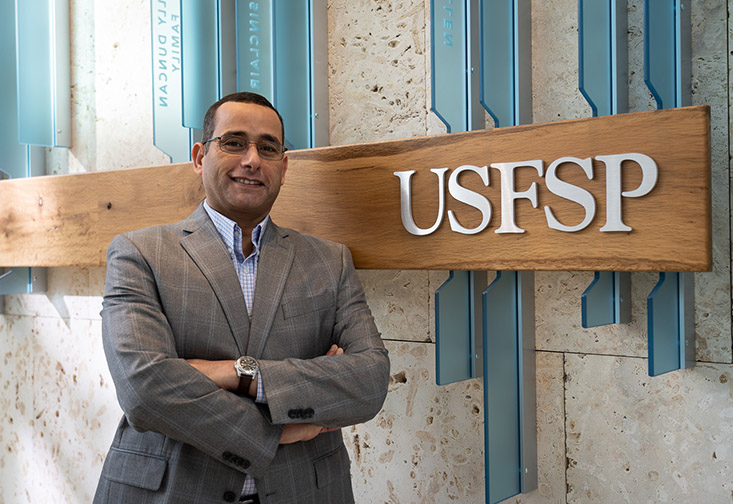Carbon released into the atmosphere by the increasing loss of Arctic permafrost, combined with higher solar absorption by the Earth’s surface due to the melting of sea ice and snow, will accelerate climate change – and have multi-trillion dollar impacts on the world economy.
USF St. Petersburg (USFSP) Professor Yasin Elshorbany is part of an international team of researchers whose findings were published today in Nature Communications. Their study reveals a combination of these factors has the potential to increase the long-term economic impact of climate change by just under $70 trillion, based on mitigation levels consistent with current national pledges to cut carbon emissions.
Under the Paris Climate Agreement target of limiting the rise of global temperature to 1.5 °C from pre-industrial levels, the economic impact drops to $25 trillion. In both cases, the primary driver behind the additional costs is the emitted carbon from permafrost loss.
Permafrost is ground that stays at or below 0 °C for two or more years. Scientists believe permafrost is thawing more quickly than expected due to climate change. As it thaws, permafrost is releasing carbon emissions into the atmosphere.
The interdisciplinary research team hope their assessments will provide a better understanding of the socio-economic risks from climate change under different scenarios and help guide policy makers towards prudent decisions on emission reduction targets.
“These results will provide more accurate and more realistic scenarios on how to prepare for the impact of climate change,” said Elshorbany, an Assistant Chemistry Professor at USFSP and a former NASA scientist.
Researchers explored simulations of complex, physical models to quantify the strength of the permafrost carbon feedback (PCF), driven by the additional carbon released from thawing permafrost, and of the surface albedo feedback (SAF), driven by the extra solar energy absorbed by the Earth’s surface as white sea ice and snow covers decline, exposing darker ocean and land.
Nearly all climate policy studies to date have implied a constant SAF and zero PCF. However, recent observations and computer models show permafrost feedback is the stronger of the two and that both are nonlinear, their strength changing in complex ways as the climate warms. This affects their impact on both the global climate and economy.
Low emissions scenarios in the study include meeting the 1.5°C and 2°C Paris Agreement targets relative to pre-industrial conditions by 2100, while medium emissions scenarios include mitigation levels consistent with current national pledges. Under this scenario, the world is set to warm by around 3°C relative to pre-industrial by 2100.
High emissions scenarios, such as the current “business as usual” trajectory – expected to lead to around 4°C of warming by 2100 and cause by far the highest impacts on ecosystems and societies – are also included.
Under all scenarios, using the strengthening Arctic feedbacks shows an increase to the total economic cost of climate change, consisting of the mitigation costs of cutting emissions, climate adaptation costs and residual climate-related impacts. The increases occur primarily through additional temperature-driven impacts on economy, ecosystems and human health and additional impacts from sea-level rise.
“This information provides incentive to take action,” said Elshorbany. “If we don’t take steps to mitigate climate change, there will be a very real cost that must be paid and will have a significant impact.”
In addition to Elshorbany, the authors of the study are Dmitry Yumashev, Gail Whiteman and Paul Young, of the Pentland Centre for Sustainability in Business and Lancaster Environment Centre at Lancaster University; Chris Hope, of the Judge Business School at the University of Cambridge; Kevin Schaefer, of the National Snow and Ice Data Centre at the University of Colorado (USA); Kathrin Riemann-Campe, of the Alfred Wegener Institute (Germany); Fernando Iglesias-Suarez, of the Institute of Physical Chemistry Rocasolano (Spain); Elchin Jafarov, of the Los Alamos National Laboratory (USA); and Eleanor J. Burke, of the UK Met Office.
